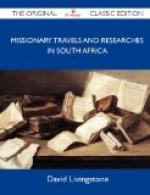On questioning intelligent men among the Bakwains as to their former knowledge of good and evil, of God and the future state, they have scouted the idea of any of them ever having been without a tolerably clear conception on all these subjects. Respecting their sense of right and wrong, they profess that nothing we indicate as sin ever appeared to them as otherwise, except the statement that it was wrong to have more wives than one; and they declare that they spoke in the same way of the direct influence exercised by God in giving rain in answer to prayers of the rain-makers, and in granting deliverances in times of danger, as they do now, before they ever heard of white men. The want, however, of any form of public worship, or of idols, or of formal prayers or sacrifice, make both Caffres and Bechuanas appear as among the most godless races of mortals known any where. But, though they all possess a distinct knowledge of a deity and of a future state, they show so little reverence, and feel so little connection with either, that it is not surprising that some have supposed them entirely ignorant on the subject. At Lotlakani we met an old Bushman who at first seemed to have no conception of morality whatever; when his heart was warmed by our presents of meat, he sat by the fire relating his early adventures: among these was killing five other Bushmen. “Two,” said he, counting on his fingers, “were females, one a male, and the other two calves.” “What a villain you are, to boast of killing women and children of your own nation! what will God say when you appear before him?” “He will say,” replied he, “that I was a very clever fellow.” This man now appeared to me as without any conscience, and, of course, responsibility; but, on trying to enlighten him by further conversation, I discovered that, though he was employing the word that is used among the Bakwains when speaking of the Deity, he had only the idea of a chief, and was all the while referring to Sekomi, while his victims were a party of rebel Bushmen against whom he had been sent. If I had known the name of God in the Bushman tongue the mistake could scarcely have occurred. It must, however, be recollected, while reflecting on the degradation of the natives of South Africa, that the farther north, the more distinct do the native ideas on religious subjects become, and I have not had any intercourse with either Caffres or Bushmen in their own tongues.
Leaving Motlatsa on the 8th of February, 1853, we passed down the Mokoko, which, in the memory of persons now living, was a flowing stream. We ourselves once saw a heavy thunder-shower make it assume its ancient appearance of running to the north. Between Lotlakani and Nchokotsa we passed the small well named Orapa; and another called Thutsa lay a little to our right—its water is salt and purgative; the salt-pan Chuantsa, having a cake of salt one inch and a half in thickness, is about ten miles to the northeast of Orapa. This deposit contains a bitter salt in addition, probably the nitrate of lime; the natives, in order to render it palatable and wholesome, mix the salt with the juice of a gummy plant, then place it in the sand and bake it by making a fire over it; the lime then becomes insoluble and tasteless.




